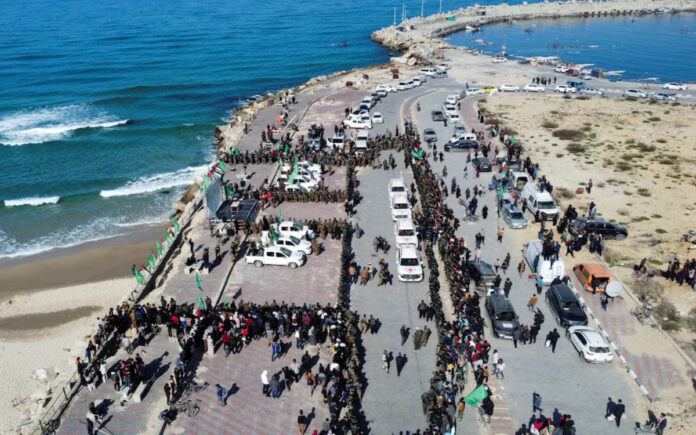Jerusalem: In a new phase of the ongoing truce aimed at halting the 15-month war in Gaza, Palestinian militant group Hamas released three Israeli hostages on Saturday, while Israel freed dozens of Palestinian prisoners and detainees in return.
Ofer Kalderon, a French-Israeli dual national, and Yarden Bibas were handed over to Red Cross officials in Khan Younis, southern Gaza, before being transferred to Israel. Separately, Israeli-American Keith Siegel was released at the Gaza City seaport.
A few hours later, 183 Palestinian prisoners and detainees were freed in the exchange. Among them, 150 returned to Gaza, while 32 disembarked in Ramallah, occupied West Bank, where large crowds gathered to welcome them. One prisoner was exiled to Egypt, according to Hamas’s prisoners’ media office.
“I feel joy despite the journey of pain and hardship that we lived,” said Ali Al-Barghouti, who had been serving two life sentences in an Israeli prison.
“The life sentence was broken and the occupation will one day be broken,” Barghouti added, as the crowd in Ramallah chanted “Allah Akbar (God is the most great)”.
Jubilant crowds greeted Palestinian prisoners who were released by Israel as they arrived in Khan Younis in Gaza and Ramallah in the West Bank https://t.co/XffEkYoVhW pic.twitter.com/Pk9LRvLAMx
— Reuters (@Reuters) February 1, 2025
Medical Evacuations from Gaza
At the newly reopened Rafah border crossing in the south, Palestinian children suffering from cancer and heart conditions were among the first patients allowed to leave Gaza for medical treatment in Egypt.
Mohammad Zaqout, a senior official in Gaza’s health ministry, criticized the limited number of medical evacuations, stating that around 18,000 people urgently require better healthcare access.
Emotional Scenes in Israel
In Israel, crowds gathered at Tel Aviv’s Hostage Square to witness the hostages’ release on large outdoor screens. Emotions ran high as cheers, applause, and tears accompanied the images of the three freed men.
Kalderon, whose children Erez and Sahar had been released in the first hostage exchange in November 2023, and Bibas were briefly seen standing on a stage in Khan Younis. Behind them was a poster featuring Hamas figures, including Mohammad Deif, the former military commander whose death was confirmed by Hamas this week. The two were then handed over to Red Cross officials.
“Ofer Kalderon is free! We share the immense relief and joy of his loved ones after 483 days of unimaginable hell,” French President Emmanuel Macron said in a statement.
Unlike Thursday’s exchange, which was marred by chaotic scenes as Hamas guards struggled to control surging crowds in Gaza, Saturday’s handover proceeded in a more orderly manner. However, uniformed Hamas fighters staged a show of force, parading in the area where the hostages were transferred, signaling their continued control over Gaza despite heavy losses in the war.
Negotiations on Remaining Hostages
So far, 18 hostages have been freed, including five Thai nationals who were unexpectedly released on Thursday. Following this latest exchange, Israel has now released a total of 583 Palestinian prisoners and detainees. Among them are militants serving life sentences for deadly attacks as well as individuals detained during the war without formal charges.
Diplomatic efforts have intensified to build a broader settlement. Israeli Prime Minister Benjamin Netanyahu is expected to meet U.S. President Donald Trump on Tuesday, with the ceasefire in Gaza and potential normalization of relations with Saudi Arabia as key discussion points.
Also Read | Uganda’s President Museveni Rejects Supreme Court Ruling, Plans to Keep Military Trials
During the initial phase of the ceasefire, 33 children, women, and elderly male hostages, along with sick and injured individuals, were set for release. However, more than 60 military-age men remain in captivity, with their fate to be determined in a second phase of negotiations set to begin by Tuesday. The talks are expected to address further hostage releases and the possible withdrawal of Israeli troops from Gaza as part of a broader deal aimed at ending the war.
The six-week truce, brokered by Egyptian and Qatari mediators with U.S. backing, has largely held, despite occasional accusations from both sides of violating the agreement. Netanyahu’s government, which includes hardliners opposed to the ceasefire, and Hamas both claim to be committed to a second-phase agreement.
Uncertain Path to Peace
Prospects for a lasting resolution remain unclear. The war began with a Hamas-led attack on Israel that resulted in 1,200 deaths and over 250 hostages taken. Israel’s subsequent military campaign has killed more than 47,000 Palestinians. Gaza lies in ruins, and deep-rooted animosities persist.
Israeli leaders maintain that Hamas cannot remain in control of Gaza, yet the group continues to assert its authority despite the loss of many of its top commanders and thousands of fighters.



